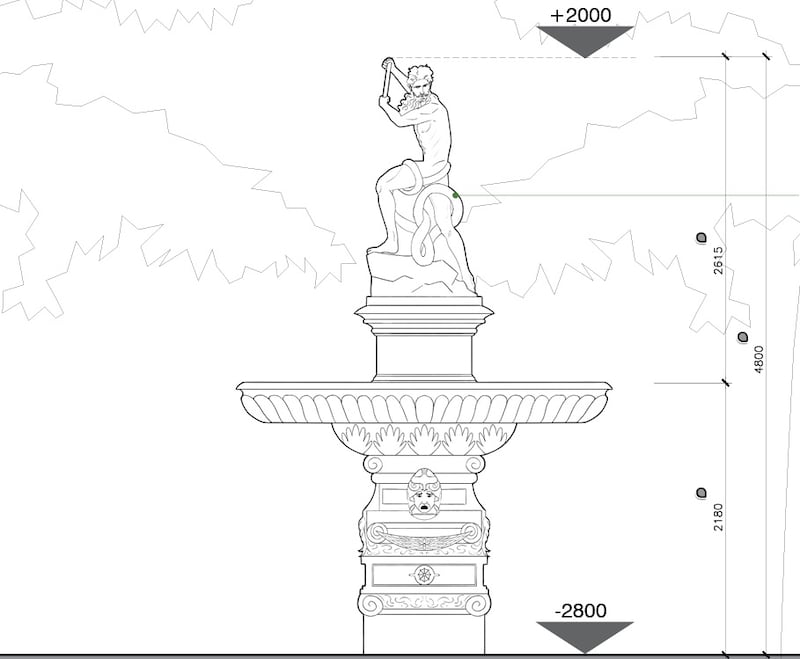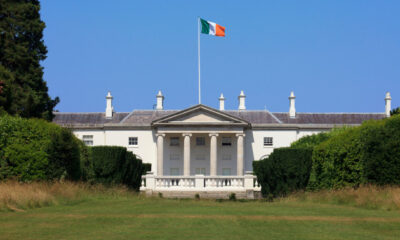
Breaking News
Def Leppard frontman’s neighbour rocked by high decibels emanating from Stepaside home

Read more on post.
“Do ya wanna get rocked?” asks Joe Elliott at the opening of Def Leppard’s 1992 hit Let’s Get Rocked.
A neighbour of the 66-year-old musician’s in south Co Dublin certainly appears to be getting shaken by ongoing works at his Stepaside home.
Christine Wunschel, Elliott’s wife, was last month granted permission by Dún Laoghaire-Rathdown County Council to install a 4.8m-tall stone sculpture on the grounds of Stepaside House.
However, a neighbour, Louise Harrison, has appealed the decision to the State’s planning authority, An Coimisiún Pleanála. She says her home is across the road from Elliott’s and construction and frequent machinery noise from his garden is “intolerable”.
“As a retired individual, I wear ear muffs in my home (from 7am to 5pm) or vacate my home to escape 5-7 men using machines in that garden six days a week, including bank holidays, so (I) drive to a car park and sit in my car to avoid their noise of between 85-130db ie akin to the noise of an aircraft taking off,” she wrote.
The appellant fears the statue could result in further noise by being converted into a water fountain given there is “a surrounding deep water basin and an outstretched limb on which a water spout could be added”.
The appeal lists Harrison’s views on an extensive history of works carried out around Stepaside House and notes her efforts to communicate with Elliott about same.
“I wrote to the owner in America, appealing for an end to the intrusive noise. His reply in 2015 stated the current project ‘is now nearing completion, so there should be no more loud noise or dust’,” she wrote.
“Ten years later – with about 4 short breaks, noise continues daily – 118.2db of machinery noise is being created as I type.”

Settler of pub rows turns 70 on big week for the Guinnesses
It has been a prolific period for the Guinness name, with the House of Guinness released on Netflix this week, the fourth earl of Iveagh, Arthur Edward (Ned) Guinness, publishing a book on his family’s history, and the latest edition of Guinness World Records coming out.
The first edition of publication once known as the Guinness Book of Records came out 70 years ago and has its roots in Co Wexford – Castlebridge to be precise, with a sign on the way into the village marking the link.
In the early 1950s, Sir Hugh Beaver, then managing director of the Guinness brewery, visited the area’s North Slob as part of a shooting party. He missed a shot at a golden plover and became embroiled in a dispute about which species of game bird was the fastest. In the days before smartphones, such answers were not easily found.

Beaver in 1954 recalled the fastest bird debate and had a light-bulb moment – a Guinness promotion based on the idea of settling pub arguments. He enlisted a pair of London researchers, twins Norris and Ross McWhirter, to compile a book of records and the rest, as they say, is history. The first edition topped the British bestseller list at Christmas in 1955 and tens of millions have sold since.
Ned Guinness’s book, Guinness: A Family Succession, is unlikely to shift similar numbers, but had a well-attended launch at Iveagh House (once owned by his family) on St Stephen’s Green (also once owned by his family) in Dublin on Monday. Former taoisigh Enda Kenny and Bertie Ahern were among those in attendance, as were businessman Denis O’Brien and dancer Michael Flatley.

You think Booker judges get to read only good books? Roddy Doyle has news for you
And then there were six. The Booker Prize shortlist was announced this week with a rags-to-riches journey, a globetrotting romance, a mysterious disappearance, a road trip inspired by a midlife crisis, post-second World War struggles and tumult in the life of an actor all featuring.
There’s no Irish author, but one of our own remains centrally involved in the process. Roddy Doyle, who won the Booker in 1993 for Paddy Clarke Ha Ha Ha, is chairing the judging panel and believes the shortlisted entries are “all brilliantly written and they are all brilliantly human”.
His gig sounds like a nice way to pass some time but, speaking to the (London) Times this week, he indicated it hasn’t all been sunshine and lollipops.
He said the judges had wondered “why we had been asked to read” some of the 153 submitted novels that they whittled down to a long list of 13.
Doyle said he signed up to be a judge to “read good books” and began to feel “a bit low” when he would encounter two bad ones in succession. He also said he was sick of small typefaces, likening one entry to “the warning you get on the back of a pack of Panadol in 17 languages”.
“You would be reading for half an hour and realise you are on the same bloody page you were half an hour ago,” he said.
That’s not the end of it: the judges must revisit the shortlisted works for a third time before choosing the winner of the £50,000 prize, which will be revealed on November 10th.

Harris claims triple lock getting ‘No, nay, never’ treatment
It’s a surprise to hear a senior politician quote The Wild Rover in the Dáil, let alone during testy exchanges about the triple lock, neutrality and Ukraine war.
Tánaiste and Minister for Defence Simon Harris last week faced questions on the issue, with People Before Profit’s Paul Murphy asking where the Government wanted to send Irish troops where it currently could not.
Murphy said “there is a cynical campaign of misinformation” by the Government around removing the triple lock (the guarantee that stops more than 12 Irish soldiers being sent into battle zones without the permission of the Government, the Dáil and the United Nations) and an insistence “there is no need to worry”.
“The Tánaiste may say that we are only ever going to send troops on missions that are called peacekeeping missions,” Murphy said, noting that no country ever said it was “doing something for its own imperialist reasons”.
“Does he know what Putin called his invasion of Ukraine? He said it was a peacekeeping mission.”
Harris said “there is an effort to be a bit mischievous here” on Murphy’s part, but “the idea of Ireland becoming a major military power or engaging in military adventurism” was at “such a remove from the reality”.
“We wish to be a country that can keep itself and its people safe, has a better idea of what goes on in our sea and skies, and plays a role in peacekeeping.”
On the wider debate about the triple lock, he said: “If the Opposition’s approach is to say: ‘No, nay, never – we will not talk to you about it and will just vote you down’, that is grand, but it is not the most constructive way to engage.”









